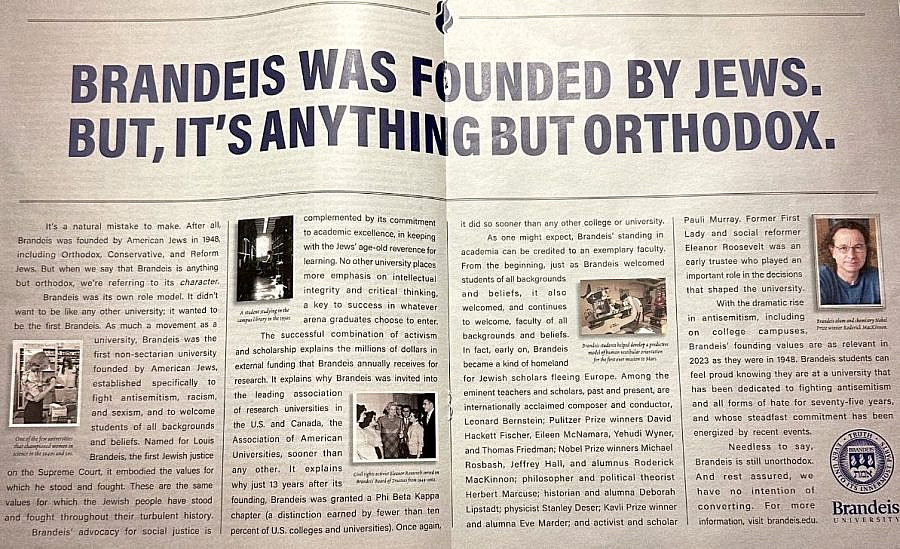
“In this ad, ‘Orthodox’ clearly means rigid, antiquated, monolithic and unevolving. Since Orthodox Jews would reject these adjectives in their self-definition, this line is problematic,” said scholar Malka Simkovich.
A page on the Brandeis University website’s about section refers to “Our Jewish roots.” Founded in 1948, the school “is animated by a set of values that are rooted in Jewish history and experience,” it states.
That includes revering learning, emphasizing critical thinking and “the Jewish ideal of making the world a better place through one’s actions and talents,” the Waltham, Mass. school states. “Brandeis is committed to making its community truly inclusive by seeking students, faculty and staff of all backgrounds, cultures, religions and experiences.”
A recent Brandeis advertisement in The New York Times Magazine, however, is drawing criticism for its lack of commitment to being inclusive of all.
“Brandeis was founded by Jews. But, it’s anything but orthodox,” reads the ad, which runs across a two-page spread. (The headline was in all capital letters, so it wasn’t clear if Brandeis meant “orthodox” or “Orthodox”; the comma appeared to be an error.)

“It’s a natural mistake to make,” the ad added. “After all, Brandeis was founded by American Jews in 1948, including Orthodox, Conservative and Reform Jews. But when we say that Brandeis is anything but orthodox, we’re referring to its character.”
The ad—evidently part of a broader branding campaign—concludes: “Needless to say, Brandeis is still unorthodox. And rest assured, we have no intention of converting.”
The ad drew criticism from prominent Jewish scholars and writers on social media.
“In this ad, ‘Orthodox’ clearly means rigid, antiquated, monolithic, and unevolving. Since Orthodox Jews would reject these adjectives in their self-definition, this line is problematic,” tweeted Malka Simkovich, chair of Jewish studies and director of the Catholic-Jewish studies program at Catholic Theological Union in Chicago.
Simkovich clarified that the ad was not antisemitic. “This ad serves to marginalize Brandeis’ own Orthodox Jewish student population by dissociating their religious identities from the mission of the school,” she wrote. “So no, not antisemitic. But yes, highly problematic.”
When a cantor tweeted that maybe Brandeis wanted to welcome non-Orthodox Jews, Simkovich responded, “A rule in inter-religious and intra-religious dialogue: You never need to raise one group up by pushing another group down.”
“Disappointing ad from Brandeis,” wrote Dovid Bashevkin, a rabbi and director of education at NCSY, the Orthodox Union’s youth wing. “But with all that actual Orthodox Jews face I find this seriously distasteful.”
He added: “This kind of pun might be cute on a podcast or a JCC or even a Federation meeting. Not a cute pun as an advertisement in the New York Times.”
Melissa Braunstein, a prominent writer in the Washington, D.C. area, noted that the Times has a history of reporting negatively on Orthodox Jews. “Proudly announcing you’ve moved away from your Jewish roots—in the New York Times!—is definitely one way to change your campus demographics,” she wrote.
“If Brandeis wants fewer Jews on campus, or more people who like NYT’s (very negative and not exactly accurate) coverage of Orthodox Jews, this is one way to get there,” Braunstein added.

“Brandeis assuring prospective students/parents it’s not ‘that’ kind of Jewish is really one for the ages,” added Lea Goldman, a writer who has served in top editorial positions, including at Forbes, Marie Claire and Refinery29.
Eitan Marks, a senior at Brandeis and president of the Brandeis Hillel’s student board, called the ad “yet another publicity blunder by my school” and tweeted that Brandeis has “a tone-deafness when it comes to speaking to the orthodox community. This ad is the perfect example.”
Orthodox students “are involved at the highest levels of student government, clubs, academia and other parts of the university,” he added. “Brandeis and Brandeis Hillel remain the best campus for Orthodox students.” (After this article published, Marks told JNS that he was tweeting personally and not on behalf of Hillel.)
Julie Jette, assistant vice president of communications at Brandeis, told JNS that the university is highlighting “our Jewish roots and values” in a branding campaign.
“This ad was a play on words meant to highlight Brandeis’ unique story and history of innovation,” she told JNS. “We are proud to support students of all Jewish denominations, along with students with other religious backgrounds.”
In response to a JNS question about whether, in hindsight, it would have approached the advertisement differently, Jette said: “We are committed to our orthodox community members, and the ad was intended not to offend, but to underscore both the diversity of our community and our unusual origin story.”
“We would encourage people to read the full ad, which discusses how Brandeis was founded by American Jews of all denominations,” she added. “The overall campaign has highlighted Brandeis’ Jewish roots and values as well as the fact that we have always been welcoming to students, faculty and staff from all backgrounds.”